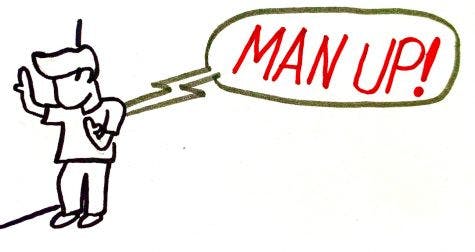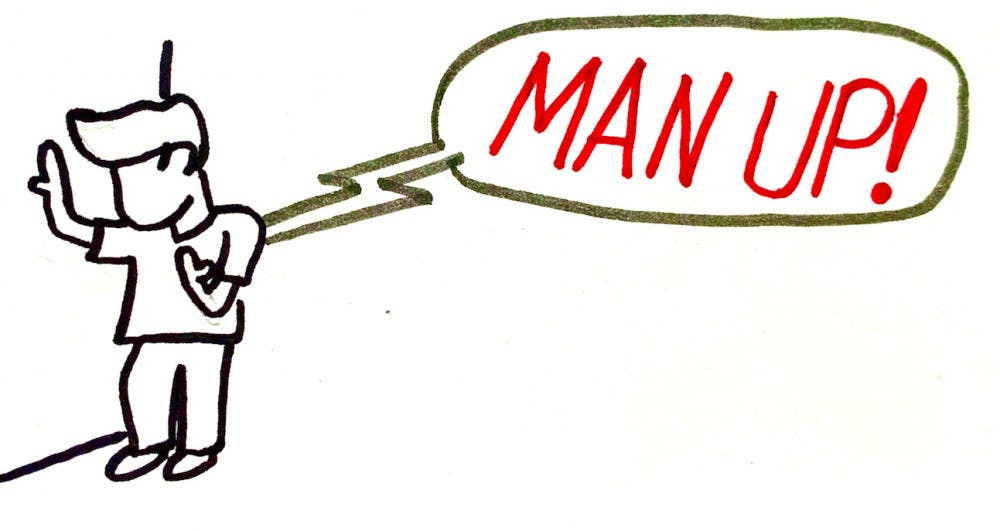When Patrick punched a hole in the wall, I was eating Goldfish and sitting on his basement couch.
His jaw, menacingly angular, was clenched with intention before he shoved his left fist through the drywall. Knuckles split, he turned to face me and cursed his father, a man who had been absent from his life for nearly a year, for sending him an unprompted text. I silently watched the blood ooze from Patrick’s hands and pool next to the white sneakers we had bought together that morning.
Surrounded by shattered drywall, I no longer recognized the sweet boy who carried an extra hairband on his wrist for me. He was enveloped by a roiling anger, one that disguised his tacit sadness and broke my heart.
From where I was sitting, this display was unmistakable.
Taxed with maintaining a “tough” persona, men are oftentimes afforded little emotional leeway to express their insecurities, sadness and struggles. Rather than being deemed “brave” for seeking help from others, guys are sometimes encouraged to bypass public expressions of sensitivity in favor of “manning up.”

Steeped in cultural pressure, our society has delineated a narrow breadth of “masculine” traits. Those who are stoic, athletic and attractive (not to mention great in bed) are adorned in gold stars sanctioned by their soaring testosterone levels. [pullquote speaker="" photo="" align="center" background="on" border="all" shadow="on"]Feelings that fall outside these demarcations are a signpost for traditional manhood’s greatest opponent: emotional vulnerability.[/pullquote]
While women are now forging multidimensional identities, men are sometimes denied comparable flexibility. Despite battling gender discrimination on various accounts, female college students excel in academics, athletics and the arts, while men interested in traditionally “feminine” activities, such as fashion or theater, have their sexualities examined under a microscope.
On the opposite side of this binary, the few times that Middlebury has engaged in conversations about masculinity, the word “toxic” has been hastily tacked on. Reeling to prove they’re not the “bad guys,” male students either condemn misogyny or stay silent to avoid implication. We spend so much time talking about what men should not be that we ignore the expectations we have placed on them.
No stand-up guy wants to be confused with a predator. He doesn’t want to be labeled a “pussy” either.
In the #MeToo era, celebrating physical and sexual prowess borders on predation. By comparison, overt affection or weakness gets you branded as a “little b*tch” among other guys. In a contemporary Catch-22, this perception falsely conflates masculinity with violence and blurs vulnerability and femininity.
In truth, competitiveness and the right dose of rowdiness are by no means problematic. Even I, a staunch feminist, understand the allure of “tough guys.” (I admit, I’m a bit of a drunk brawler, so a scar or black eye is right up my alley.) [pullquote speaker="" photo="" align="center" background="on" border="all" shadow="on"]When strength and sensitivity become mutually exclusive, however, we deny men the platforms to express softer emotions while keeping their “man card.”[/pullquote]
* * *
Crinkling the aluminum of his third Miller Lite, Penn State senior Matt Auerbach muses in agreement. (He’s usually a Coors guy but the pandemic has limited his usual alcohol inventory.) “I think one of the biggest problems is the fact that people keep telling [men] to ‘be yourself’ and ‘express your emotions,’” he said. “In the same vein [we] look down on men who do open up and are vulnerable.” This dilemma demonstrates a nominal commitment to progress without challenging any of the constraints men face. Telling someone to be “compassionate yet stern” or both “stoic and expressive” is a semantic blur of 1950s tradition with 21st-century cognizance.
Interestingly, emotional suppression seems to loosen when women are involved. Clark Cossin, a 21-year-old Swiss native, echoes this sentiment when he describes his relationship with his parents. Squinting at the overcast sky, he lights a cig over FaceTime. “It’s a different kind of love from a father than it is from a mother,” he shares, migrating outside to puff smoke into the Saint-Prex landscape. “Compassion — I think that’s the mom’s role. And the dad’s role is to instill discipline.”
The tendency for men to turn to trusted women for guidance illuminates the relative security in opening up to the “more emotional” sex. Part of this perception harks back to the traditional role of a loving woman maintaining household unity as she bakes bread for her breadwinning husband. Sourdough may have enjoyed a recent comeback, but these stereotypes need not follow. Mothers, girlfriends and sisters — possibly unequipped to handle a deluge of pent-up emotion — become the filters for feelings supposedly too “effeminate” for male friendships. However, eschewing these challenging yet oftentimes worthwhile discussions within male friendships codifies stereotypical macho identities.
Johnny D’Aversa, a senior at Rensselaer Polytechnic Institute, feels less pressure to keep up this charade. “When my girlfriend dumped me,” he shares, “I called [my friend] Peter and I cried on the phone a little bit.” His strikingly light eyes — thick brows perched above them — briefly dart to the bubble bath he’s preparing. “But I don’t think most guys would do that,” he adds quickly.
Despite individual commitments to open-mindedness and activism, many Middlebury students have likely experienced the manifestations of society’s dominant, gendered culture. A Pew Research Center survey found that only 50% of respondents thought society looked favorably on “caring” men. That figure jumped to nearly 100% when applied to women.
These trends, although not necessarily Middlebury-specific, lay the foundation for what is an “acceptable” way for men to act in friendships, in the workplace and, of course, in college. Until we create space within our Middlebury community for a wide range of emotional expression independent of sex (yes, that includes crying), it will be impossible to find common ground with one another. Perhaps it is time for our private identities to bleed into our public lives.
Being a “real” man then is much more than bench-pressing and banging.
Maria Kaouris is a member of the class of 2021 and a columnist for The Campus.
Sit down, shut up and be a man

Comments



